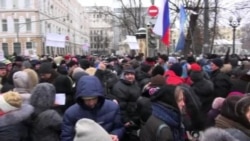MOSCOW —
Russia’s new law banning American adoptions of Russian orphans is polarizing Russians into two camps: pro-West and anti-West.
Russia’s parliament voted overwhelmingly last month to bar Americans from adopting Russian orphans. But the vote triggered this last week the largest protest Moscow has seen since President Vladimir Putin was inaugurated last May.
Anastasia, a high school student, joined a mass protest against the adoption ban with her father and his two adopted children. She is studying English and was eager to register her protest.
"It's really awful that our Duma decided this law because it's really a law of dishonest people,” she said in English.
Nearby in the march of 25,000 protesters was Anna Glukhova, deputy director of an international trading company. She accused Russia’s parliament, or Duma, of voting for the ban in order to distract attention from the case of Moscow lawyer Sergei Magnitsky, who died in a Moscow prison three years ago. Impunity in the case has drawn criticism from Europe and the United States.
“The actions of the Duma upset us,” said Glukhova, who was marching with her husband. “It is scandalous to use orphan children to cover up the murder of Magnitsky. They are ready to sell their conscience. We are not. That is why they are there. And we are here.”
Ekaterina, a 39-year-old mother of a son, held a sign with a sarcastic message: “Clearly, I am a State Department agent, but don’t take revenge on children!”
“What's incredible is that the majority is convinced that America is bad, that we are cooperating with American agents, or even that they pay us,” she said.
Five blocks and two days away from the protests, Duma Deputy Evgeny Fedorov was scornful of the protesters.
“The participants of the recent protests in Russia, I see them as strange people because they support selling our own children overseas,” said Fedorov, who trained in the Soviet era to be a military engineer.
Fedorov, a deputy with the ruling United Russia party, criticized the new American law that bans American visas and bank accounts for Russian officials suspected of involvement in the Magnitsky case and other human rights violations. He called the new law an attack on Russia.
“In the law it is written openly that Russians are second class people,” Fedorov said, giving his interpretation of the ban. “That is not welcomed by Russia. Everyone has made this mistake, Hitler, not understanding the mentality of the Russian people.”
Swedish economist Anders Aslund is based in Washington, where he is a senior fellow with the Peterson Institute for International Economics. On a visit to Moscow Thursday, he said the big picture is that President Putin is trying to retain his domestic political base by exploiting Russians’ historic suspicion of the West.
"President Putin ran his campaign on anti-Americanism as one of the big things,” Aslund said, referring to the Russian presidential election campaign of one year ago. “And to the surprise of everybody, he has not let down, but aggravated this campaign."
At the demonstration, Andrei Kazakevich said politicians are hurting real people.
“I think it is ridiculous. I think it is hurting our children,” said Kazakevich, an English-speaking job recruiter.
At the end of the march, protesters threw photos of Duma deputies in a dumpster. The posters were marked: “Shame.”
Russia’s parliament voted overwhelmingly last month to bar Americans from adopting Russian orphans. But the vote triggered this last week the largest protest Moscow has seen since President Vladimir Putin was inaugurated last May.
Anastasia, a high school student, joined a mass protest against the adoption ban with her father and his two adopted children. She is studying English and was eager to register her protest.
"It's really awful that our Duma decided this law because it's really a law of dishonest people,” she said in English.
Nearby in the march of 25,000 protesters was Anna Glukhova, deputy director of an international trading company. She accused Russia’s parliament, or Duma, of voting for the ban in order to distract attention from the case of Moscow lawyer Sergei Magnitsky, who died in a Moscow prison three years ago. Impunity in the case has drawn criticism from Europe and the United States.
“The actions of the Duma upset us,” said Glukhova, who was marching with her husband. “It is scandalous to use orphan children to cover up the murder of Magnitsky. They are ready to sell their conscience. We are not. That is why they are there. And we are here.”
Ekaterina, a 39-year-old mother of a son, held a sign with a sarcastic message: “Clearly, I am a State Department agent, but don’t take revenge on children!”
“What's incredible is that the majority is convinced that America is bad, that we are cooperating with American agents, or even that they pay us,” she said.
Five blocks and two days away from the protests, Duma Deputy Evgeny Fedorov was scornful of the protesters.
“The participants of the recent protests in Russia, I see them as strange people because they support selling our own children overseas,” said Fedorov, who trained in the Soviet era to be a military engineer.
Fedorov, a deputy with the ruling United Russia party, criticized the new American law that bans American visas and bank accounts for Russian officials suspected of involvement in the Magnitsky case and other human rights violations. He called the new law an attack on Russia.
“In the law it is written openly that Russians are second class people,” Fedorov said, giving his interpretation of the ban. “That is not welcomed by Russia. Everyone has made this mistake, Hitler, not understanding the mentality of the Russian people.”
Swedish economist Anders Aslund is based in Washington, where he is a senior fellow with the Peterson Institute for International Economics. On a visit to Moscow Thursday, he said the big picture is that President Putin is trying to retain his domestic political base by exploiting Russians’ historic suspicion of the West.
"President Putin ran his campaign on anti-Americanism as one of the big things,” Aslund said, referring to the Russian presidential election campaign of one year ago. “And to the surprise of everybody, he has not let down, but aggravated this campaign."
At the demonstration, Andrei Kazakevich said politicians are hurting real people.
“I think it is ridiculous. I think it is hurting our children,” said Kazakevich, an English-speaking job recruiter.
At the end of the march, protesters threw photos of Duma deputies in a dumpster. The posters were marked: “Shame.”






